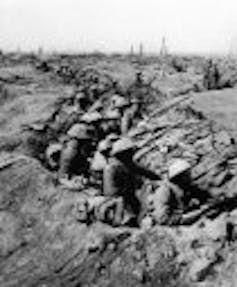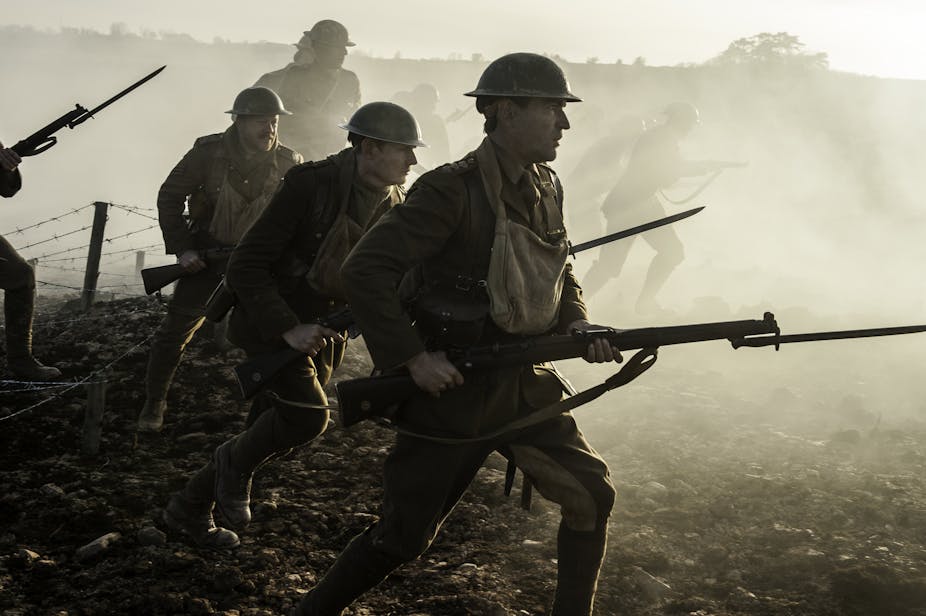For the average soldier on the Western Front, very little happened on a day-to-day basis. Even when soldiers were at the front line, they watched and waited. Boredom was a major problem. But the prospect of action gave soldiers plenty of opportunity to feel not just boredom, but fear. Both could be relieved by humour. And The Wipers Times was partly a product of soldiers’ need to tackle both the boredom and the fear.
When are soldiers most afraid? Undoubtedly, there is a very special type of fear which takes hold in moments of battle. But those who have written about their own experiences recognise that in such times, “fear” becomes part of a complicated set of feelings. Those include selflessness, determination and exhilaration, driven of course partly by adrenalin, while the effects of military training also play their part.
But what of fear outside battle? What happened when soldiers sat in dank trenches, under constant risk of being obliterated by unheralded shells or sniper fire? Driven by portrayals such as Blackadder Goes Forth, people today often have very inaccurate views of what the daily life of a British soldier in the World War I was like. Particularly, there is a tendency to imagine that soldiers lived all their days in dugouts in trenches.
In fact, even frontline infantry battalions would not spend the majority of their time in trenches, let alone in the firing line. Far more common for the infantry was a spell of about a week each month in trenches (though it was sometimes much longer), with perhaps only half of the waking hours spent in the firing line.
Yet despite such times in the trenches being a minority of soldiers’ time at war, they were probably the most fearful – and rationally so. With little to do other than guard and watch, soldiers had time to think, and worry. Insidious fears had time to creep in.
Letters home
Unsurprisingly, gallows humour was a coping mechanism. One approach is set out in the Staniforth Letters. Despite being a product of Charterhouse School, and an Oxford undergraduate at the war’s outbreak, JHM “Max” Staniforth enlisted as a private so that he could find out what soldiering was like. He chose the Connaught Rangers due to historic family connections with the regiment, but within a few months had been made an officer in the 7th battalion of the Leinsters.

Staniforth wrote exhaustive letters home to his parents, not quite every day, but usually a few times a week. That alone points to a common coping mechanism in the trenches – writing home.
In September 1916, Staniforth found himself on the Somme. Writing on September 12, shortly after his battalion had been engaged in the successful operations at Guillemont and Ginchy, he gave an insight into coping, in a witty postscript to a letter:
The only way to be here is to be philosophical. We have evolved a philosophy accordingly. What do you think of it?
If you are a soldier, you are either:
(1) at home or (2) at the Front.
If (1), you needn’t worry.
If (2), you are either (1) out of the danger zone or (2) in it.
If (1), you needn’t worry.
If (2), you are either (1) not hit, or (2) hit.
If (1), you needn’t worry.
If (2) you are either (1) trivial or (2) dangerous.
If (1), you needn’t worry.
If (2), you either (1) live or (2) die.
If you live, you needn’t worry: and – If you die, YOU CAN’T WORRY!!
So why worry?
Of course, as with much else which soldiers wrote to loved ones, some of this was intended to calm nerves at home. If fear was insidious in trenches when soldiers knew that they might come under fire, they at least knew precisely when they were not in danger in their spells out of trenches (the majority of their time). But for many of those at home, with no knowledge of battalion movements, fear could be ever present as they sat wondering.
Gallows humour
Fatalism and gallows humour could be consoling for soldiers. “We’re here because we’re here because we’re here because we’re here” ran the song. Many soldiers knew that that there was little they could do, not only about their general orders and location, but about what might happen specifically to them. That did not, of course, stop many having superstitions about what rituals and behaviour might help - which is another story entirely.
Aside from coping with fear, humour was also present in Staniforth’s letters as a way of making light of the arduous work which many soldiers undertook away from the front. Despite the fact that the 7th Leinsters would gain a reputation as very effective raiders of enemy trenches, and to some extent had an “elite” (in fighting terms) reputation within their division - the 16th (Irish), they did their fair share of slogging.
In early 1916, Staniforth wrote about how he and a working party had dug latrines while in billets. He said: “All I have done to-day to make the world a better and a nobler place is to take out a party in the rain and build a princely row of latrines in Madame’s orchard.” After a lengthy description of the work involved, he ended with a ditty:
A hard world. Hand me the office harp:-
“What did you do in the Great War, Dad?”
“I dug latrines – for others, my lad.”
It was toilet humour, literally, rather than in the usual sense. But just as in the The Wipers Times, it was crucial in maintaining morale.

